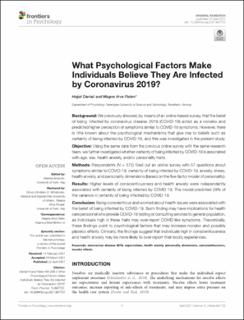| dc.description.abstract | Background: We previously showed, by means of an online-based survey, that the belief of being infected by coronavirus disease 2019 (COVID-19) acted as a nocebo and predicted higher perception of symptoms similar to COVID-19 symptoms. However, there is little known about the psychological mechanisms that give rise to beliefs such as certainty of being infected by COVID-19, and this was investigated in the present study.
Objective: Using the same data from the previous online survey with the same research team, we further investigated whether certainty of being infected by COVID-19 is associated with age, sex, health anxiety, and/or personality traits.
Methods: Respondents (N = 375) filled out an online survey with 57 questions about symptoms similar to COVID-19, certainty of being infected by COVID-19, anxiety, stress, health anxiety, and personality dimensions (based on the five-factor model of personality).
Results: Higher levels of conscientiousness and health anxiety were independently associated with certainty of being infected by COVID-19. The model predicted 29% of the variance in certainty of being infected by COVID-19.
Conclusion: Being conscientious and worried about health issues were associated with the belief of being infected by COVID-19. Such finding may have implications for health care personnel who provide COVID-19 testing or consulting services to general population, as individuals high in these traits may over-report COVID-like symptoms. Theoretically, these findings point to psychological factors that may increase nocebo and possibly placebo effects. Clinically, the findings suggest that individuals high in conscientiousness and health anxiety may be more likely to over-report their bodily experiences. | en_US |

